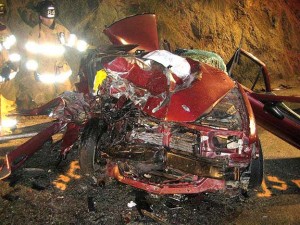
Toyota may soon settle at least some wrongful injury and death claims rather than drag the fight out in court.
Toyota appears to be moving towards settling two high-profile unintended acceleration lawsuits in a bid to put the embarrassing issue to rest – and avoid having potentially damaging go before juries, according to a new report.
The maker announced a tentative, $1.2 billion settlement late last month with a group of owners who had sued alleging the unintended acceleration scandal had reduced the value of their vehicles. But that agreement – since given tentative approval by a federal job in Southern California – did not cover wrongful death and injury cases.
At least some of those would be covered under a new settlement, said the Los Angeles Times, including two deaths in a horrific 2010 crash in Utah. The world’s largest automaker still faces more than 300 sudden acceleration lawsuits in state and federal courts.
Many plaintiffs blame faulty electronics for alleging causing their vehicles to unexpectedly race out of control – a claim Toyota has consistently denied. The company has maintained that the only defects that could have caused the problem were improperly installed floor mats and sticky gas pedals.
The maker has ordered a number of recalls too deal with those issues starting in 2009 and including a callback last year impacting Lexus RX crossovers. The federal government later fined Toyota for illegally delaying that Lexus recall. The maker has faced a series of fines levied by the National Highway Traffic Safety Administration in connection with unintended acceleration problems.
But two studies commissioned by NHTSA – including one conducted by NASA — found no flaws in the automaker’s electronics and pointed to driver error as a more likely cause.
Still, legal experts said juries hearing emotional cases involving serious injuries or deaths could come to a different conclusion, potentially exposing Toyota to massive, headline-grabbing verdicts that could sully its reputation. The automaker, they said, appears to be following a well-worn playbook used by big companies in mass litigation: settle cases in which the risk of losing is deemed too great and aggressively defend those that would play favorably in court.
“The strategy is to settle and move on rather than risk a huge loss,” said Byron Stier, an expert on major products litigation at Southwestern Law School in Los Angeles who has extensively studied the Toyota cases. “The wrong case could stir up a lot of bad publicity, so just move on.”
For Toyota, paying off plaintiffs in catastrophic injury or death suits might cost tens of millions of dollars, experts told The Times. But these private settlements would keep potentially sensitive evidence out of the courtroom that could aid plaintiffs in other lawsuits. For example, some plaintiffs’ attorneys have been examining the source code for Toyota’s throttle management system in preparation for trial, reviewing millions of pages of company engineering documents, and consulting with electronics and software experts.
It would also put toughest cases to rest outside of a courtroom, helping Toyota put sudden acceleration issue behind it.
There’s little doubt Toyota would like to move on. The maker not only had to face the unintended acceleration scandal – which led to the recall of more than 10 million vehicles and the grilling of senior executives by Congress – but it then had to deal with the effects of Japan’s March 2011 earthquake and tsunami, which all but shut the companies plants down for a number of months.
“It’s been a real challenge for everyone,” Senior Vice President Bill Fay told TheDetroitBureau.com, adding that he thought Toyota had learned a lot from its trials and tribulations “and everyone is a little smarter and wiser.”
Even with a settlement, it’s not sure Toyota’s image would be washed clean. The maker wound up recalling more vehicles than any other auto manufacturer in 2012, the third time that has happened in four years.

The sad reality is this unintended acceleration lawsuits will never end in America for Toyota or other auto companies, because the U.S. is the land of litigation. Jackpot justice rewards the incompetent and braindead people in the U.S. who refuse to take responsibility for their inappropriate behavior.
Any other country would toss these bogus lawsuits in a heartbeat, but not in the U.S…
Toyota continues to lie! I own a 2003 Camry and it wasn’t just a few months after I bought it that the floor mat wasn’t replaced properly by the Car Wash attendant and the gas peddle got stuck on the floor mate. I didn’t notify Toyota but just re hooked the mat to its hooks. A year later after taking it to Toyota for 10k scheduled maintenance I noticed the gas peddle had been replaced with a shorter one. Again I didn’t contact Toyota and ask why this was done, my wife said I was nuts but said she did remember being in the car when the gas peddle got stuck. She can’t explain and neither can Toyota, the fix is not on file with them and Toyota is the only place we take if for service. It’s been a hide the problem all along and they really should pay for what they have done. Jail time for not recalling them sooner would be my recommendation!